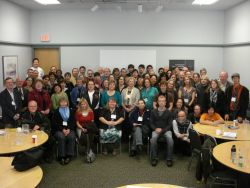STORY about EducationCooperativesSolidarity posted on November 6, 2010 by Greg Dean
High Spirits & Commitment Help Keep Co-operative 'Movement' Going
Workers' Co-ops Conference in Vancouver Mulls the Alternatives
Attending the events of the Canadian Workers’ Co-operative Federation (CWCF) conference, what most struck me, was how much of a climb there is for co-operative culture. Or as Andre Guimond remarked, “it shows how far there is to go when education [about co-ops] is often the starting point that’s discussed”.
Marty Frost, winner of the Merit Award from the Federation for his cooperative developments across the country, pointed to delays in delivery of approved funds from the Cooperative Development Initiative as foiling too many groups of workers who’s plans fall apart in the lengthy waits for help. Asked if the decline in new cooperatives he was seeing came from a lack of interest at all, Marty replied “oh no, in the countryside there’s wide-spread interest, many people are asking about cooperatives or talking about their agricultural and food cooperatives”.
There was good attendance of the conference by young people, who were quite enthusiastic about cooperatives as a vehicle to supersede market dynamics in their communities. Jamie Campbell of Mondragon and Participatory IT (ParIT) cooperatives in Winnipeg was acclaimed to the board of the Federation, and will ‘represent’ the youth segment of cooperators, many of whom have very clear ideas and vision for where to go. Jamie’s ParIT co-op “[primarily] loves to develop tools for co-ops” and can talk intelligibly on mechanisms and methods for co-operative development. Those tools include enterprise management software, and work on point-of-sale payment processing machines for the credit union and co-operative sector. He’s also keen on promoting the international 7 principles of cooperatives, especially number 6 which calls on co-operatives to do business with each other.
Anti-capitalist and libertarian socialist sentiment ran fairly strong, with even a keynote speaker – CEO of The Suzuki Foundation, Peter Robinson – being put on the spot ahead of his speech by a CWCF delegate, who asked him if he is an anti-capitalist. At Marty Frosts’ presentation of a documentary about an Argentine co-operative Peter Gill of Van.Act said out of the side of his mouth during Q&A, “ya, but how do co-ops ever get around capitalism”.
There was a magnanimous mood at the conference, whether it was internal, from credit unions such as Vancity speaker Andy Broderick, New Westminster NDP MP Peter Julian in a side discussion with Peter Hough of the CWCF, or from the “The Cooperators” insurance company. Spirits and solidarity were most definitely high.
Flying in the face of high spirits are the many challenges the cooperative sector faces. Whether it was “I don’t see what we have to talk about” from an attendee of the Manitoba caucus, or the random proposals and topics at the B.C. caucus, there was certainly an underwhelming lack of options and consolidated capacity to spring board plans and discussions off of. Despite the square 1 and 2 nature of many discussions, the commitment to invigorate a cooperative ‘movement’ was resounding, as exemplified to by Paul Burrows’ willingness to take a huge loss selling the Mondragon building in Winnipeg to that co-operative at the same price he acquired it for in 1996.
As Marty Frost, the central co-operatives developer in B.C. can attest to, workers are having trouble finding their feet in co-operatives in this Great Recession. This bucks the trend of proliferating co-operatives in tough economic times, especially as we saw during the 1930s, in places like California and the Prairies. One is left with the impression that the widespread calls at the Workers Co-op conference for more education and promotion of the co-operative alternative is all too called for.
The site for the Vancouver local of The Media Co-op has been archived and will no longer be updated. Please visit the main Media Co-op website to learn more about the organization.
